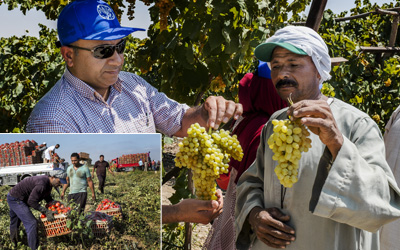Objectives
- Generate knowledge on the status, magnitude and extent of food losses and waste in Egypt.
- Technical and managerial capacity of defined food value chain actors (farmers, traders, processors, transporters, laborers), with an emphasis of women organizations, are increased to better coordinate, negotiate and organize in food chain activities.
- Technologies and good practices to reduce food losses and waste are acquired and adopted by defined value chain actors, with a specific focus on Small and Medium Agricultural Enterprises (SMAEs), including food safety and quality improvement.
- Improved linkages/business partnerships are activated to increase value addition in selected and defined value chains.
Loss and Waste along the Value Chain Stages
Production and harvest: Crops damaged, bruised or left behind in fields due to poor post-harvest handling practices and poor harvesting skills - crops sorted out because of the lack of awareness for standards and quality.
Storage: Deterioration in quality and pests/disease attacks due to inadequate storage facilities and techniques.
Processing and packaging: Spillage, damage or contamination causing quality and quantity loss due to inadequate processing and packaging methods.
Transportation and distribution: Damage and spillage during transport because of inadequate transportation and distribution systems.
Wholesale and retail markets: Spilled or damaged crops and products in market due to inadequate infrastructure and poor handling.
Consumption (Hotels, restaurants, catering and households): Items not eaten for different reasons due to poor storage/stock management, lack of awareness, and consumer behavior.
Main Activities
In Egypt, the project is focusing on tomatoes and grapes value chains originating from the main areas of production with targeted support to post-harvest handling, value addition and/or processing, and marketing.
- Studying the value chains for tomatoes and grapes and analyzing the levels and causes of food loss in value chains, and developing a monitoring system for losses.
- Conducting awareness campaigns on the levels and impacts of losses, and help generate demand for better quality products.
- Supporting market information flows, access to knowledge and training, and vertical linkages among small-scale farmers, traders, transporters, and buyers.
- Introducing value-addition activities and providing a package of technical, marketing, and business support to beneficiaries organizations.
- Training in post-harvest handling for value chain actors.
- Studying environmental effects of food losses and opportunities for reuse and recycling of grapes and tomatoes waste.
Stakeholders
The main stakeholders in the project are the actors in tomato and grape value chains originating in Nubaria and Sharkia. In particular, small-scale farmers, small-scale traders and SMAEs, with cooperatives, associations and local communities, as well as support service providers to the specified food chains.
Egypt is the NENA region’s most populous country with over 92 million people and a projected 120 million by 2050. Rapid population growth, along with limited fresh water resources and arable land, is placing greater stress on Egypt’s rural and urban food systems in terms of quantity, and in terms of changing food preferences towards highvalue, more perishable fruits and vegetables.
While food needs are growing, FLW in Egypt are high, especially for perishable products. Across the region, fruit and vegetable FLW are estimated to reach 45- 55 percent of production annually. Baseline data for this project estimates quantitative loss of over 45 percent of grapes and over 50 percent of tomatoes in the production, retail and wholesale stages of the value chain alone, along with serious loss to quality.
The project aims to reduce FLW through a value chain development approach, focusing on the post-harvest, marketing and processing stages and promoting value chains that are better organized, have a reduced impact on the environment, more inclusive of smallholders, better able to generate added value, providing increased opportunities for rural off-farm and/or agro-industry employment.
Latest Topics

Story - Mabrook: Food for me means my family, which is my life
Boosting knowledge for a better harvest
2018

World Food Day 2018 - Our Actions are our Future
Family farmers, chefs, activists, private businesses, government employees and officials talk about their actions to achieve Zero Hunger.


